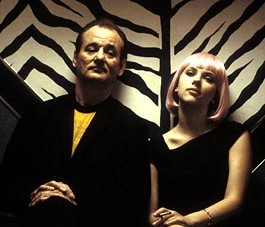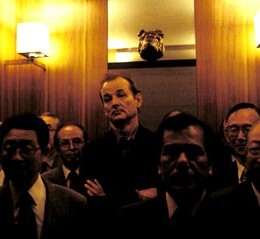 So I finally broke my month-long movieless streak last night with Lost in Translation, an unflinching look at the agony and torment of the human soul that is lying around your five-star Tokyo hotel with nothing to do. I’m a bit conflicted on this one…It’s definitely worth seeing – The film is funny, touching, sweet, often entrancing, and Bill Murray is really wonderful in the lead. It captures the disembodied detachment of travel insomnia and the exquisite anticipation of a newly-made connection in ways that belie the standard Hollywood older-man-meets-younger-woman narrative (Re: mogul wish fulfillment.)
So I finally broke my month-long movieless streak last night with Lost in Translation, an unflinching look at the agony and torment of the human soul that is lying around your five-star Tokyo hotel with nothing to do. I’m a bit conflicted on this one…It’s definitely worth seeing – The film is funny, touching, sweet, often entrancing, and Bill Murray is really wonderful in the lead. It captures the disembodied detachment of travel insomnia and the exquisite anticipation of a newly-made connection in ways that belie the standard Hollywood older-man-meets-younger-woman narrative (Re: mogul wish fulfillment.)
All that being said, I do have nagging problems with Translation. For one, as I alluded above, this story could only have been written by deeply privileged people: I found it hard to empathize with Scarlett Johansson’s Charlotte, who responds to being alone on the far side of the world with all kinds of time on her hands mainly by sitting in her hotel room and feeling miserable. (It makes more sense with Murray’s Bob, who’s clearly seen and done it all by now.)
 Plus, it often seems like Sofia Coppola is calling out a few hits on people throughout the film. Charlotte’s busy, self-absorbed photographer husband (Giovanni Ribisi) seems less than a degree of separation from Spike Jonze, and the story takes time out to bag on white hip-hoppers (the Beasties?) and film starlets (Anna Faris of May, basically playing a cruel version of Cameron Diaz) in a manner that I found more vindictive than funny. (There’s an exchange involving Evelyn Waugh that – perhaps it’s meant to be this way – makes Charlotte seem deeply unsympathetic, exactly the type of know-it-all snob you wouldn’t want to spend a week in Tokyo with.) In fact, the movie wants to have it both ways – when Bob and Charlotte karaoke classic songs by Elvis Costello, The Pretenders, and Roxy Music (One of the best uses of music since Donnie Darko, even if the choices seem more like Coppola’s than the characters), it’s relationship development…A few scenes later, when the starlet character belts out Carly Simon, it’s a sight gag. Finally, while Translation makes a great postcard for Tokyo, there end up being just a few too many “zany Japanese” engrish jokes and setpieces.
Plus, it often seems like Sofia Coppola is calling out a few hits on people throughout the film. Charlotte’s busy, self-absorbed photographer husband (Giovanni Ribisi) seems less than a degree of separation from Spike Jonze, and the story takes time out to bag on white hip-hoppers (the Beasties?) and film starlets (Anna Faris of May, basically playing a cruel version of Cameron Diaz) in a manner that I found more vindictive than funny. (There’s an exchange involving Evelyn Waugh that – perhaps it’s meant to be this way – makes Charlotte seem deeply unsympathetic, exactly the type of know-it-all snob you wouldn’t want to spend a week in Tokyo with.) In fact, the movie wants to have it both ways – when Bob and Charlotte karaoke classic songs by Elvis Costello, The Pretenders, and Roxy Music (One of the best uses of music since Donnie Darko, even if the choices seem more like Coppola’s than the characters), it’s relationship development…A few scenes later, when the starlet character belts out Carly Simon, it’s a sight gag. Finally, while Translation makes a great postcard for Tokyo, there end up being just a few too many “zany Japanese” engrish jokes and setpieces.
But, not to lose the forest for the trees, I did quite like Lost in Translation. The film is honest and poignant in its depiction of two ships passing in the night, and Bill Murray – almost always good these days – is outstanding. Only once in the film, when he and Charlotte chase the Suntory whiskey bus, did he seem to slip into traditional Ghostbusters-era Bill Murray-dom. The rest of the time, Murray’s a sadder, sleepier, and more resigned fellow than the wiseass we’re accustomed to on the screen. Even scenes with patently unbelievable dialogue (Bob talking to his wife in the bath, for example) are redeemed by Murray here. His performance alone makes the movie worth seeing, and I wouldn’t be surprised if he’s given a nod somewhere come award time.

